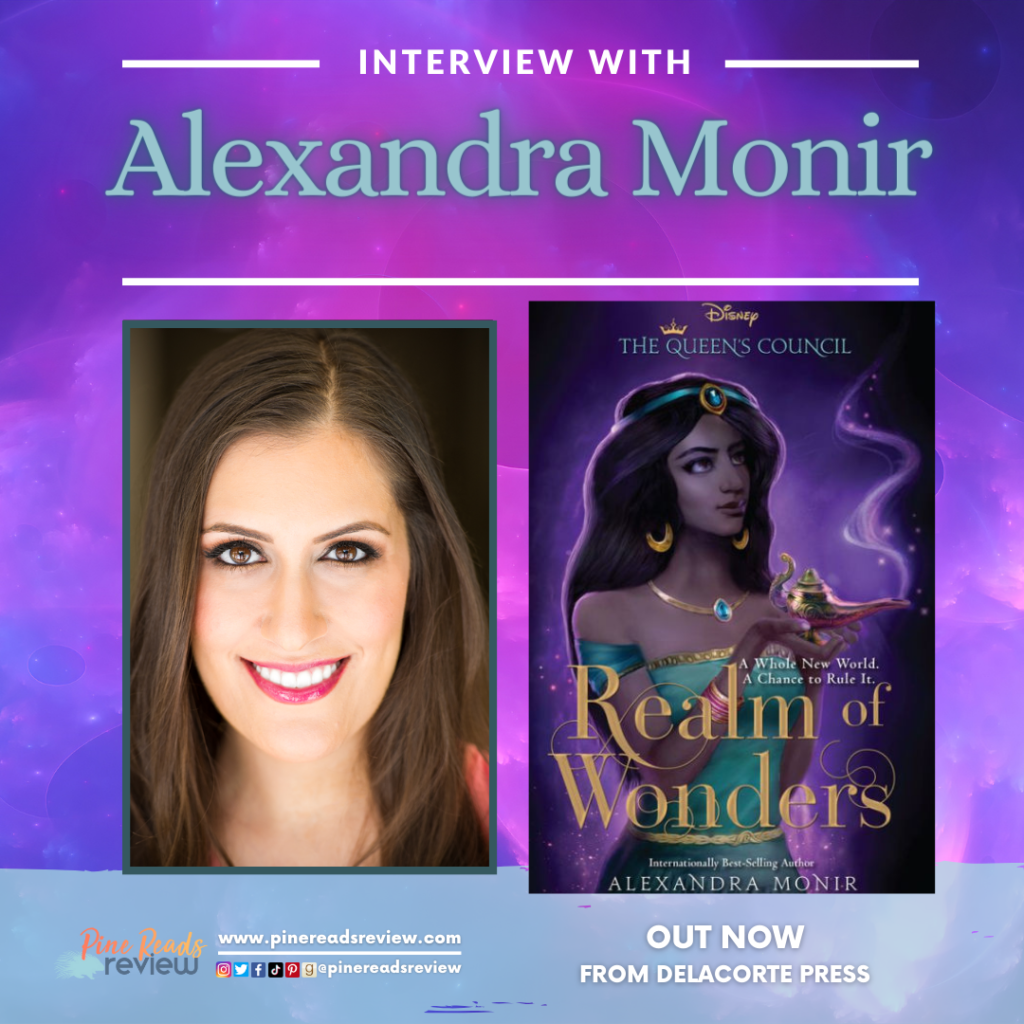
About the Author: “Alexandra Monir is the Iranian-American author of the internationally best-selling novel The Final Six, which has been translated into numerous languages around the world; the DC Comics superhero novel Black Canary: Breaking Silence, from the New York Times-bestselling DC Icons series; and several other books for young adults. Alexandra spent her teen years as a pop singer before publishing her debut novel, Timeless, and continues to write music. She lives in Los Angeles with her husband and young son and daughter” (Bio from author).
Find Alexandra Monir on the following platforms:
Alexandra Monir: Thank you for having me! And yes, I can’t believe October 10th is nearly here! I’m feeling so excited, emotional, nervous, thrilled—all the emotions! ☺ It really is an ultimate dream project for me, and I just hope readers and Disney fans will love it.
AM: Something that always interested me the most about Jasmine is that she is one of the only Disney princesses who is technically heir to the throne—but in the original animated movie, that wasn’t acknowledged since it was Aladdin’s story, and the thought was that he would succeed the sultan. I really wanted to explore the reality of Jasmine being the heir apparent and what that would look like in such a patriarchal culture—would the powerful men overseeing the kingdom of Agrabah even let her be sultana? It almost seemed more realistic that they would find some kind of loophole to deny her the throne, and that’s what led me to the idea of the Crown Tournament. It also gave me so much to work with plot-wise, and it presented an opportunity for her character to grow dramatically over the course of the story.
AM: Rather than reinventing Jasmine, my approach was to further develop the character traits we already know and love, like her strength and bravery, her quick wit, the way she sees people for who they really are and not their “station” or rank, and then also explore her more vulnerable sides that we didn’t get to see in the movie. For example, we know Jasmine’s mother died when she was young and so she was raised by a single father who just so happened to be the sultan. How would that affect her and shape her personality? That was one of the questions I thought about a lot while writing her story.
AM: It was so important to me to write a confident, empowering Middle Eastern character like Jasmine, someone who knows her worth and fights for the power that is rightfully hers, especially because historically, women from the Middle East have been portrayed as subservient, oppressed, and meek—the opposite of how most of us are! For the longest time, Jasmine was the only positive representation we had in the media, which is one of the reasons she and the movie Aladdin are so close to my heart—and so I really tried to honor her by giving her, and the other female characters in the story, as much depth and nuance as possible, while hopefully making Jasmine a role model for a new generation, just as she was for me.
AM: Always!! The story of Scheherazade has been a huge part of my life since basically birth, because my mom was named after her, and my mom is also a recording artist and songwriter who composed and recorded a whole album based on One Thousand and One Nights back when I was a kid! So I grew up with the story of Scheherazade as much as I did with Aladdin and Jasmine, and knowing that their story originated through Scheherazade’s One Thousand and One Nights made it an instant lightbulb moment for me, almost as soon as I started drafting the book—I knew I had to weave her in!
AM: Well, definitely Jasmine, of course! ☺ But other princesses I was obsessed with as a kid also include Snow White (a trip to Snow White on Ice when I was 2 is my Disney superfan origin story!) and Ariel, plus I always related so much to Belle over her love of books!
AM: The original animated movie! It’s been part of my soul since I was, like, seven! ☺
AM: I love getting to write spooky thrills and chills, so the horror elements were a lot of fun. I think horror and fantasy go well together, since the fantasy setting and magic allow the reader to suspend disbelief and buy the different twists and scares!
AM: Thank you so much! It meant so much to me that Disney was actively seeking out a Middle Eastern author to tell this story, and that they were so supportive of me weaving in elements of my Persian culture. For more on Iranian culture and folklore, I highly recommend the Shahnameh, which translates to Book of Kings, an incredible epic fantasy from ancient Persia. My mom ZaZa actually wrote and recorded an amazing album inspired by Book of Kings as well, and our very close family friend, Josiane Cohanim, recently completed an entire English translation of the Shahnameh. I highly recommend both!
AM: Yes, although I’m not allowed to say too much just yet! The upcoming project I’m most excited about right now is for TV—an adaptation of one of my books—and I’ve been hired to write the pilot script. Hopefully this will get greenlit and end up on your screens sometime soon!
Aruna Sreenivasan, Pine Reads Review Assistant Director & Writer